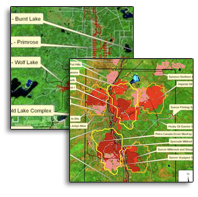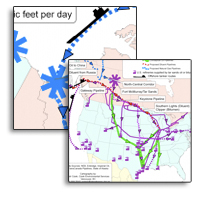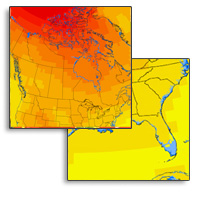Tar Sands 101
The Tar Sands "Gigaproject" is the largest industrial project in human history and likely also the most destructive. The tar sands mining procedure releases at least three times the CO2 emissions as regular oil production and is slated to become the single largest industrial contributor in North America to Climate Change.
The tar sands are already slated to be the cause of up to the second fastest rate of deforestation on the planet behind the Amazon Rainforest Basin. Currently approved projects will see 3 million barrels of tar sands mock crude produced daily by 2018; for each barrel of oil up to as high as five barrels of water are used.
Human health in many communities has seriously taken a turn for the worse with many causes alleged to be from tar sands production. Tar sands production has led to many serious social issues throughout Alberta, from housing crises to the vast expansion of temporary foreign worker programs that racialize and exploit so-called non-citizens. Infrastructure from pipelines to refineries to super tanker oil traffic on the seas crosses the continent in all directions to allthree major oceans and the Gulf of Mexico.
The mock oil produced primarily is consumed in the United States and helps to subsidize continued wars of aggression against other oil producing nations such as Iraq, Venezuela and Iran.
To understand the tar sands in more depth, continue to our Tar Sands 101 reading list
Quebec students launch anti-austerity, pro-environment 'social strike' and movement
Quebec students launch anti-austerity, pro-environment 'social strike' and movement
By Roger Annis
March 25, 2015
Rabble Blog
Post-secondary students across Quebec have launched a “social strike” and protest movement opposing hikes in tuition fees and other austerity measures of the Quebec provincial government. They are also condemning the destructive environmental policies of the Canadian and Quebec governments.
Environmentalists ask Chicago mayor to investigate BP oil spill
Environmentalists ask Chicago mayor to investigate BP oil spill
By Tara Kadioglu Post-Tribune
March 25, 2015
Environmentalist claim heavy oil leak was tar sands
Environmental activists delivered a letter to Mayor Rahm Emanuel Wednesday demanding a public report and investigation into at least 1,600 gallons of heavy crude oil spilled into Lake Michigan last year from BP's Whiting refinery.
BP confirms oil spill into Lake Michigan from Whiting refinery
While We’ve Been Debating Keystone, The U.S. Has Grown Its Pipeline Network By Almost A Quarter
While We’ve Been Debating Keystone, The U.S. Has Grown Its Pipeline Network By Almost A Quarter
by Katie Valentine Posted on March 16, 2015
Americans have been waiting for the federal government to come to a decision over the Keystone XL pipeline for more than six years, enduring countless protests, Congressional hearings and even a Presidential veto over the controversial project.
But during that time, pipeline construction in the U.S. hasn’t slowed — in fact, it’s surged.
Environment: New tar sands rules too weak to protect the Athabasca River
Environment: Canadian Citizen groups say new tar sands rules too weak to protect the Athabasca River
Posted on March 14, 2015
by Bob Berwyn
Staff Report
FRISCO — A set of proposed new water rules has unleashed a storm of protest in Canada, where citizen and conservation groups charge that the government is giving away the store to energy companies exploiting the tar sans of Alberta.
Koch's use economic downtime to buy up tar sands
Koch company buys up more oil sands licenses in Canada
Jenny Uechi
Mar 12th, 2015
Koch Oil Sands Operating ULC is buying up more licenses in Alberta's oil sands, Oilsands Review reported today.
"Bulletin records show that 15 licences were issued on March 3, 2015, for operator Koch Oil Sands in the Cadotte area," the Review reported.
Oilsands leases comprised $21 million of the $44.67 million generated by Alberta's Wednesday land sale.
U.S. Senate fails to override Obama’s veto of Keystone XL bill
U.S. Senate fails to override Obama’s veto of Keystone XL bill
Paul Koring
WASHINGTON — The Globe and Mail
Published Wednesday, Mar. 04 2015
Keystone XL backers in the U.S. Senate failed Wednesday to override President Barack Obama’s veto of congressional efforts to approve the controversial Canadian oil sands pipeline.
CNRL lectures tar sands producers on costs
Cut costs or face ‘death spiral,’ CNRL warns oil sands
PETER SCOWEN
FORT McMURRAY, ALTA. — The Globe and Mail
Published Thursday, Feb. 19 2015
The president of one of Canada’s biggest oil and gas producers delivered a stern warning to the oil sands industry, telling a room full of Fort McMurray business people that they need to start cutting costs or the industry will fall into a “death spiral.”
The “made in Fort McMurray cost” of doing business has risen too quickly and must end, Steve Laut of Canadian Natural Resources Ltd. told members of the local Chamber of Commerce.
Tar sands campaigners are Canada's new 'terrorists'
Tar sands campaigners are Canada's new 'terrorists'
Pete Dolack
5th March 2015
Canada's 'Anti-Terrorism Bill' proposes a massive increase in the power of security services, writes Pete Dolack - and in the crosshairs are campaigners against a tar sands industry that's intent on releasing 240 billion tonnes of CO2 into the atmosphere, and those fighting the pipelines needed to get the heavy crude to market. Who are the real 'extremists'?
Koch brothers' tar sands connection revealed
Koch brothers' tar sands connection revealed
U.S. billionaire duo's huge stake in northern Alberta fields more than Conoco, Exxon and Chevron put together
by Enzo DiMatteo
March 4, 2015
A map released by the San Francisco-based International Forum on Globalization (IFG) shows that the U.S. billionaire Koch brothers own more of the Alberta tar sands, some 890,000 hectares (2 million acres), than oil and gas giants Exxon, Chevron and Conoco combined.
Alberta floats idea of moving tar-sands oil through Alaska
With Keystone XL pipeline uncertain, Alberta floats idea of moving tar-sands oil through Alaska
02/10/2015
Officials in the Canadian province of Alberta say they hope to talk to Alaska leaders about shipping tar-sands crude oil through the state as the Keystone XL pipeline route through the Lower 48 remains bogged down in politics.
An Alaska economist said the idea faces many challenges but is possible.
"The desert is full of mirages, but the desert also has water," said Gunnar Knapp, director of the University of Alaska Anchorage's Institute of Social and Economic Research.



